2017 Jao Tsung-I Visiting Professor: Lecture Series Since its inception in 1963, CUHK has been dedicated to modernising and disseminating Chinese culture through studies in the humanities and social sciences. Professor Jao Tsung-I is an advocate of sinology, and has made an immense contribution to the development of academic and cultural exchanges between China and the West. CUHK shares the same mission – to inherit and promote Chinese culture. In 2013 CUHK set up the Visiting Professorship Scheme under the Institute of Chinese Studies, and the University is truly honoured to have this Scheme named after Professor Jao Tsung-I. Through the Scheme, every year a world-class Chinese cultural research scholar is invited for academic research and scholarly exchange at the Institute of CUHK. The Jao Tsung-I Visiting Professors will, it is hoped, inspire the young generation and further promote Chinese culture. Professor Nils Göran David Malmqvist, a leading Swedish sinologist, Professor Léon Vandermeersch, a renowned French sinologist, and Professor Xuan Xingpei, renowned scholar from Peking University, were previously selected as Jao Tsung-I Visiting Professors. The Institute of Chinese Studies at The Chinese University of Hong Kong (CUHK) is greatly honoured to welcome the renowned scholar from the University of California, Los Angeles, Professor CHOU Hung-hsiang, as the Jao Tsung-I Visiting Professor this year. Professor Chou will present three public lectures on 3, 19 and 27 April on campus. Summaries of the lectures are presented below. 1. Studying Under Professor Jao Tsung-I: A Vague, Yet Clear Memory
Date: 3 April, 2017 (Monday)
Time: 4:30 – 6:00 p.m.
Venue: Cho Yiu Hall, G/F University Administration Building, CUHK
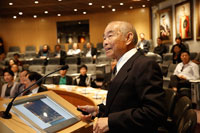 After graduating from High School in 1952, Professor Hung-hsiang Chou became Professor Jao Tsung-I's student and research assistant. Professor Chou gradually became more involved with Professor Jao, occasionally helping with housework, for example, and over time Professor Chou became Professor Jao's "disciple", in the traditional sense. A few years later, Mrs Jao and their two daughters came to Hong Kong from their hometown, Chaozhou, to join Professor Jao. Along with Professor Chou, they moved to a new residence, living together as a family. In 1958 Professor Chou published his first book, "The Imperial Records of the Shang-Yin Dynasty". With the assistance of Professor Jao's friend Dr Noel Barnard, Professor Chou was awarded a four-year full scholarship from the Australian National University and began working with Dr Barnard as a Ph.D. student at the Department of Far Eastern History. Professor Chou's research focus was mainly on the oracle bone inscriptions of the Shang Dynasty (1600–1046 BC), but the profound influence of Professor Jao and his extremely broad field of research led Professor Chou to extend his research interests from oracle bones to other fields. Professor Chou's talk looks back at his research and experience of living with Professor Jao and the Jao family. After graduating from High School in 1952, Professor Hung-hsiang Chou became Professor Jao Tsung-I's student and research assistant. Professor Chou gradually became more involved with Professor Jao, occasionally helping with housework, for example, and over time Professor Chou became Professor Jao's "disciple", in the traditional sense. A few years later, Mrs Jao and their two daughters came to Hong Kong from their hometown, Chaozhou, to join Professor Jao. Along with Professor Chou, they moved to a new residence, living together as a family. In 1958 Professor Chou published his first book, "The Imperial Records of the Shang-Yin Dynasty". With the assistance of Professor Jao's friend Dr Noel Barnard, Professor Chou was awarded a four-year full scholarship from the Australian National University and began working with Dr Barnard as a Ph.D. student at the Department of Far Eastern History. Professor Chou's research focus was mainly on the oracle bone inscriptions of the Shang Dynasty (1600–1046 BC), but the profound influence of Professor Jao and his extremely broad field of research led Professor Chou to extend his research interests from oracle bones to other fields. Professor Chou's talk looks back at his research and experience of living with Professor Jao and the Jao family.
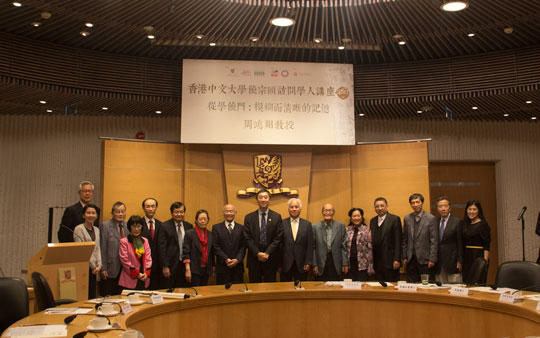
2. Around the World to Visit Oracle Bone Collections: Studies of Oracle Bone Inscriptions for Half a Century
Date: 19 April, 2017 (Wednesday)
Time: 2:30 – 4:00 p.m.
Venue: Staff Common Room, Top Floor, Cheung Chuk Shan Amenities Building, United College, CUHK
*Co-organised by United College
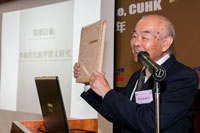 In 1963, Professor Hung-hsiang Chou received a four-year full PhD scholarship from The Australian National University, including a one-year worldwide trip from 24 June 24 1963 to 14 June 1964 to collect research material for his Ph.D. dissertation. He visited oracle bone collections in important museums, libraries and private collectors around the world, and made rubbings, photos or pencil copies with detailed notes of the bones and shells. He was the first to conduct this type of research. In 1963, Professor Hung-hsiang Chou received a four-year full PhD scholarship from The Australian National University, including a one-year worldwide trip from 24 June 24 1963 to 14 June 1964 to collect research material for his Ph.D. dissertation. He visited oracle bone collections in important museums, libraries and private collectors around the world, and made rubbings, photos or pencil copies with detailed notes of the bones and shells. He was the first to conduct this type of research. From the capital of Australia, Canberra, Professor Chou went through Hong Kong, Taipei, Taichung, then to Kyoto, Nara, and Tokyo in Japan, and on to Toronto and Ottawa in Canada. Professor Chou then visited around 10 cities in the United States and at least 10 more in 9 European countries. In this talk, Professor Chou will discuss his experience and academic gains from the trip, and the problems he encountered with the Shang Dynasty bones and shells in terms of originals, forgeries and replicas. He will also talk of his interesting experiences of airlines, airplanes, buses and general travel at that time. 3. From the Same Origin: The Source of the Chinese Decimal and the Ganzhi System
Date: 27 April, 2017 (Thursday)
Time: 4:30 – 6:00 p.m.
Venue: Activities Room, 2/F Art Museum East Wing, CUHK
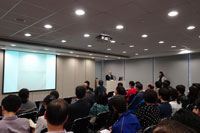 In Chinese culture, the words一,二,三,四,五,六,七,八,九,十for the decimal system, the Ten Heavenly Stems甲,乙,丙,丁,戊,己,庚,辛,壬,癸 and the Twelve Earthly Branches子,醜,寅,卯,辰,巳,午,未,申,酉,戌,亥play a very important role in daily lives and in the spread of Chinese culture. However, there are numerous different theories on the origins of these 32 graphs. This is the so-called "Multiple Origins" theory. Professor Chou is of the opinion that these three groups of graphs are "numbers" and "orders" related to "expression" and "communication", and thus should have the same origin, which is the "hands" or the "fingers" identified by some early Oracle Bone scholars, or so-called "sign language." Professor Chou uses numerous examples from the Oracle Bone Inscriptions to prove this theory. In Chinese culture, the words一,二,三,四,五,六,七,八,九,十for the decimal system, the Ten Heavenly Stems甲,乙,丙,丁,戊,己,庚,辛,壬,癸 and the Twelve Earthly Branches子,醜,寅,卯,辰,巳,午,未,申,酉,戌,亥play a very important role in daily lives and in the spread of Chinese culture. However, there are numerous different theories on the origins of these 32 graphs. This is the so-called "Multiple Origins" theory. Professor Chou is of the opinion that these three groups of graphs are "numbers" and "orders" related to "expression" and "communication", and thus should have the same origin, which is the "hands" or the "fingers" identified by some early Oracle Bone scholars, or so-called "sign language." Professor Chou uses numerous examples from the Oracle Bone Inscriptions to prove this theory.
Maritime Silk Road Suite, jointly organised by the T.T. Ng Chinese Language Research Centre, the Institute of Chinese Studies and the Department of Chinese Language and Literature (April 7–8, 2017)
The T.T. Ng Chinese Language Research Centre and the Department of Chinese Language and Literature of The Chinese University of Hong Kong (CUHK) jointly organised the "Maritime Silk Road Suite", a series of academic activities in March and April 2017 focusing on the linguistic properties of the Chinese spoken in countries and areas along the 21st-century Maritime Silk Road. 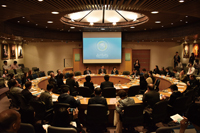 Three lectures were held on 27 March, 3 April and 5 April at the CUHK University Bookstore Activity Room. The first was presented by Professor Grace Mak of the CUHK Department of Chinese Language and Literature on "Movies, Education, and Cultures in Southeast Asia". The second, "A Dialogue between Two Non-native Speakers" was chaired by Professor Tang Sze Wing from the CUHK Department of Chinese Language and Literature, who was joined by Ven. Jessadah and Ms Kanyapach Chaidach. The third lecture was "Glimpses of Singapore Chinese Culture" by Professor Lian-Hee Wee from the Department of English Language and Literature, Hong Kong Baptist University. Three lectures were held on 27 March, 3 April and 5 April at the CUHK University Bookstore Activity Room. The first was presented by Professor Grace Mak of the CUHK Department of Chinese Language and Literature on "Movies, Education, and Cultures in Southeast Asia". The second, "A Dialogue between Two Non-native Speakers" was chaired by Professor Tang Sze Wing from the CUHK Department of Chinese Language and Literature, who was joined by Ven. Jessadah and Ms Kanyapach Chaidach. The third lecture was "Glimpses of Singapore Chinese Culture" by Professor Lian-Hee Wee from the Department of English Language and Literature, Hong Kong Baptist University.
"The International Symposium on Chinese in the Maritime Silk Road" was one highlight of the celebrations of the 50th Anniversary of the Institute of Chinese Studies and the 60th Anniversary of the United College of CUHK. The Symposium held on 7–8 April was the first international linguistics activity to examine the 21st Century Maritime Silk Road from the unique perspective of the Belt and Road Initiative, and brought together more than 100 scholars from around the world to investigate the linguistic properties of Chinese spoken in the countries and areas along the Silk Road. The officiating guests of the opening ceremony included Provost Professor Benjamin W. Wah, Pro-Vice-Chancellor Professor Fanny M.C. Cheung, and the Director of ICS, Professor Leung Yuen-sang.
Participants shared their knowledge and research on the Chinese language overseas and aspects of Chinese linguistics through the event, covering topics such as phonology, lexicology, syntax, sociolinguistics, language teaching in addition to languages and cultures. It also covered the Chinese teaching and learning for non-Chinese speaking students in Hong Kong.
The Republic of China and its Eyewitness Accounts by Research Centre for Contemporary Chinese Culture (May 12–14, 2017)
The international symposium "The Republic of China and its Eyewitness Accounts" was held from 12–14 May. Twenty-eight scholars from China, Taiwan, Hong Kong, Japan and Korea including Professor CHANG Yu-fa, Professor YANG Tianshi, Professor ZHU Ying, Professor HUANG Ko-wu, Professor DUAN Ruicong, Professor Kyounghan BAE and Professor ZHENG Huixin from ICS presented their essays. Around 100 people attended. As numerous historical documents and diaries of the period have been discovered and published, it is hoped that the conference can help to promote and strengthen the study of the history of the Republic of China.
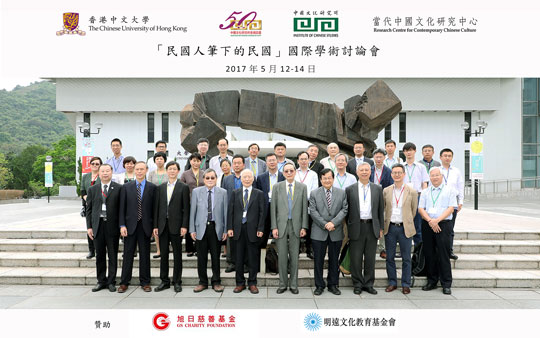
2017 Young Scholars' Forum in Chinese Studies, jointly organised by CUHK–Chiang Ching-kuo Foundation Asia-Pacific Centre (CCK-APC) for Chinese Studies and ICS (May 25–27, 2017)
The 2017 Young Scholars' Forum in Chinese Studies, organised by CCK-APC and ICS, was held from 25–27 May at The Chinese University of Hong Kong. The Forum aims to nurture young scholars in Chinese Studies and strengthen the networks they can utilise in the future. The Forum invited Ph.D. students who had completed their qualifying examinations, and Ph.D. graduates with less than five years' working experience, to present their recent research output on any aspect of Chinese Studies, drawing on but not limited to the disciplines of history, literature, religion, art and thought. The theme of the 2017 forum is "Cultural Exchange between China and Inter-Asia". Conference papers are selected by a review committee from CUHK.  This year, the Forum received 261 applications and a total of 34 applicants were selected by the Committee, including 8 from Hong Kong, 5 from China, 10 from other Asian regions including Taiwan, South Korea, Singapore and Japan and another 11 from Europe and North America. Conference papers are divided into 10 panels scheduled over a period of 3 days. The panels are categorised according to the themes and the research areas of the papers, as follows: This year, the Forum received 261 applications and a total of 34 applicants were selected by the Committee, including 8 from Hong Kong, 5 from China, 10 from other Asian regions including Taiwan, South Korea, Singapore and Japan and another 11 from Europe and North America. Conference papers are divided into 10 panels scheduled over a period of 3 days. The panels are categorised according to the themes and the research areas of the papers, as follows:
1. Cultural Exchange between China, Southeast Asia and India
2. Cultural Exchange between China and Korea
3. Cultural Exchange between China, Korea, Singapore and Malaysia
4. Cultural Exchange between China and Vietnam
5. Cultural Exchange in Arts
6. Cultural Exchange and Translation
7. Cultural Exchange between China and Japan
8. Dynastic China and Borderlands
9. Cultural Exchange between China, Northeast and Central Asia
10. Cultural Exchange in Religions
Local faculties from various departments such as Fine Arts, History and Cultural and Religious Studies served as discussants for the selected papers at the Forum. We are very glad to have Professor Lo Kwai-cheung, APC Visiting Scholar 2017, as the moderator in the panel "Dynastic China and Borderlands", to share and give guidance to young scholars. Three participants shared their forum experiences, as follows.
Dr Chia-chi Chao, Ph.D. in Department of Chinese Language and Literature, National Tsing-Hua University, Taiwan
The annual Young Scholar Forum organised by CUHK is a guiding conference gathering potential young scholars in Chinese studies around the world. In 2015, I first participated in the forum, and at that time, I was impressed by the openness, impartiality and high standards. The forum offered a friendly platform for the academic interaction of young scholars. This year, I was honoured to attend the forum again, and again its spirit of open-mindedness was extended to all participants. Not only did the presenters have opportunities to share their latest research, but the moderators of each panel contributed insightful and valuable advice, which was extremely helpful to the presenters. For me, participating in the forum is a fruitful experience, which both broadens my horizons and my academic network. I would like to offer my deepest appreciation particularly to the chief organiser Professor Lai Chi-tim, in his effort to support the young academic generation, and to Professor Ya Jia for giving me her constructive advice and to all the participating staff, who were always willing to give their warm and patient assistance throughout the three-day forum. I believe the forum is certainly an abundant resource and shining example to young scholars, encouraging their dreams and passion along the academic road. Egas Moniz Bandeira, Ph.D. candidate at the University of Heidelberg
The Young Scholars' Forum in Chinese studies was a wonderful opportunity to meet other young sinologists from different countries and who focus on different research areas. The broad yet well-defined theme of the forum brought together scholars specialising in cultural exchanges between China and other regions in Asia. The organisers succeeded in making a well-balanced selection of papers, setting up ten panels dealing with either specific regions (China's cultural exchanges with Japan, Central Asia, Vietnam, etc.) or specific topics (arts, religion, etc.). This mixture of papers proved to be quite felicitous, as it allowed for stimulating debates and sometimes unexpected intellectual cross-fertilisation between our respective topics. The two and a half days of the forum were full of fascinating presentations and discussions, and I also received valuable feedback on my own paper on the late Qing constitutional movement. Finally, I would like to thank the CUHK staff, who were extremely welcoming and helpful at all times. I am glad that my first visit to Hong Kong was to participate in this fine event at CUHK.
Dr Rebecca Ehrenwirth, Ph.D. in Ludwig-Maximilians University, Munich
From 25–27 May The Chinese University of Hong Kong held the 4th Young Scholar's Forum on Chinese Studies. Thirty-three presenters from more than a dozen different countries came together to introduce their research and exchange with fellow students. The presentations were subdivided into ten panels, each with a discussant who provided each presenter with individual constructive criticism. Thus the participants received feedback from the audience and, more importantly, in most cases by an expert in their research field.
A great variety of topics was presented, from Archaeology to Literature to Politics, History and Art – each presentation was not only unique in content but also in the style of presentation. The atmosphere during the Forum was very pleasant. The participants had the opportunity to continue their discussions during the provided collective lunch breaks and dinners, thus fostering exchange between the participants. In my opinion the Young Scholars' Forum is one of its kind. It enhances communication and exchange between young researchers and also provides them with necessary criticism by their peers. I have never experienced such a perfectly organised and useful conference, particularly due to the well-prepared feedback of the discussants.
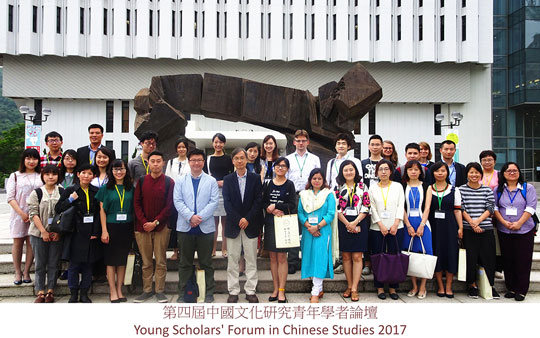
|




















